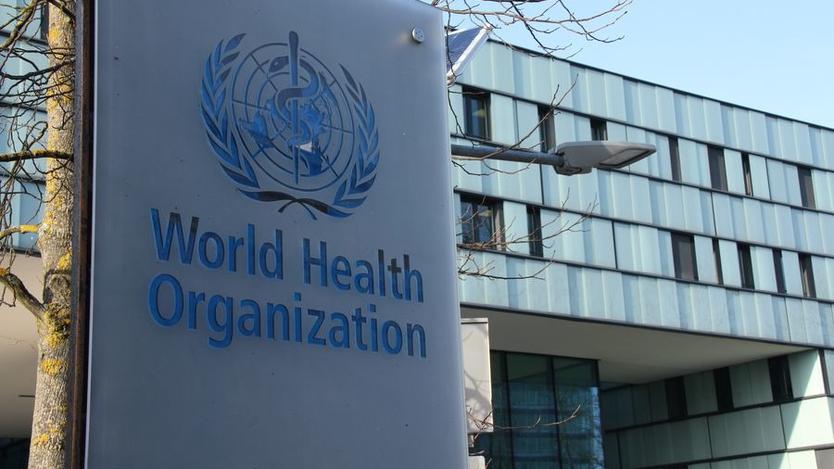 Photo taken on Jan 22, 2020 shows an exterior view of the headquarters of the World Health Organization (WHO) in Geneva, Switzerland. (LIU QU/XINHUA)
Photo taken on Jan 22, 2020 shows an exterior view of the headquarters of the World Health Organization (WHO) in Geneva, Switzerland. (LIU QU/XINHUA)
LONDON / BERLIN / BRAZZAVILLE / COPENHAGEN / HELSINKI / PARIS / HAVANA - A World Health Organization regional office Thursday calls for caution and consideration of the risks involved, with multiple African countries lifting their COVID-19 health restrictions.
With new COVID-19 cases significantly dropping, many African countries are increasingly curtailing COVID-19 surveillance and quarantine measures. While the need to reopen economies and resume social life is important, countries need to be cautious and take into consideration the possible risks, said Dr Matshidiso Moeti, WHO regional director for Africa, at an online press conference.
With the evolution of the pandemic, countries in the region have moved towards prioritized contact tracing, where only contacts at high risk of infection or falling severely ill are followed.
Based on analysis of open-source data, WHO finds that by March 15, 22 African countries are no longer carrying out any kind of contact tracing, as only 13 countries are conducting comprehensive surveillance.
According to WHO, the continent is seeing a decline of COVID-19 testing rates. In the first quarter of 2022, only 27 percent of countries were achieving the weekly target of tests per 10,000 population, a concerning decrease in testing rates compared with 2021, when 40 percent of countries reached the same benchmark.
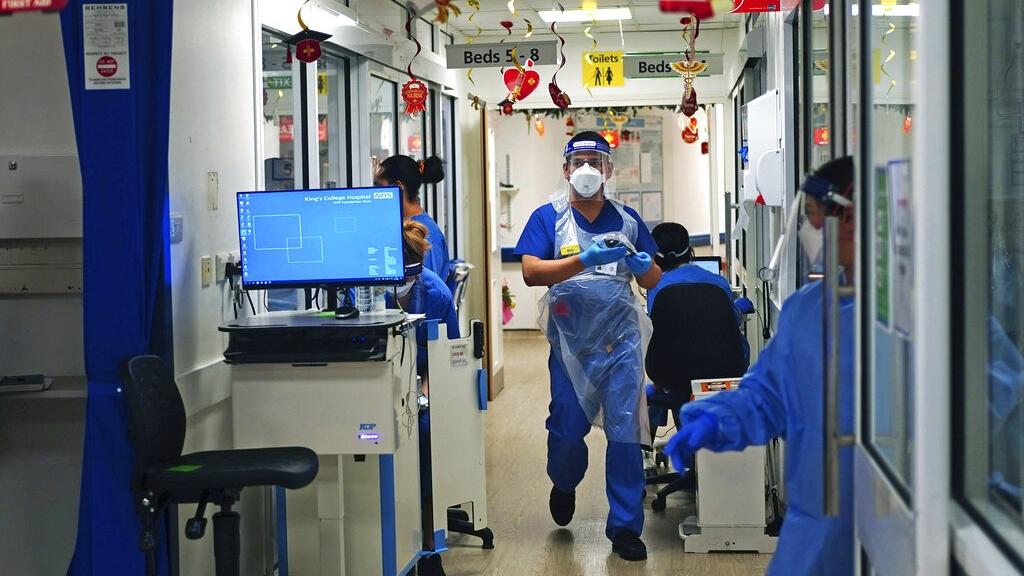 Medical staff wears PPE on a ward for COVID-19 patients at King's College Hospital in south east London on Dec 21, 2021. (VICTORIA JONES / PA VIA AP)
Medical staff wears PPE on a ward for COVID-19 patients at King's College Hospital in south east London on Dec 21, 2021. (VICTORIA JONES / PA VIA AP)
Britain
A booster dose of vaccine against COVID-19 continues to provide robust protection against hospitalization for older people nearly four months after getting the third dose, new data from the UK's Health Security Agency on Thursday showed.
Vaccine effectiveness against hospitalization for people aged over 65, 15 weeks after a booster, was 85 percent, down from 91 percent two weeks after getting the third dose, the latest vaccine surveillance report from the agency estimated.
The data is the first released by the UK on the longer term durability of boosters. The UK is administering fourth doses to vulnerable age groups, joining a number of other countries including Israel as the world fights the more infectious Omicron variant of the coronavirus.
Fourth doses will be given six months after the third dose and a wider campaign is being considered for the autumn.
The report attempts to distinguish between people who were hospitalized because of COVID-19 and those who were in hospital with an illness and test positive as part of routine checks.
The figures come from its calculations regarding people who are in hospital primarily because of respiratory problems, which suggests their admission is more likely to be COVID-related.
For people aged 18-64, vaccine effectiveness against hospitalization appears to show a steeper drop - to 67 percent after 15 weeks, compared with 88 percent two weeks after the dose.
However, the report reiterated that protection against symptomatic disease falls much more dramatically for all groups: from around 60 to 75 percent effectiveness two to four weeks after a booster, to between 25-40 percent after 15 weeks.
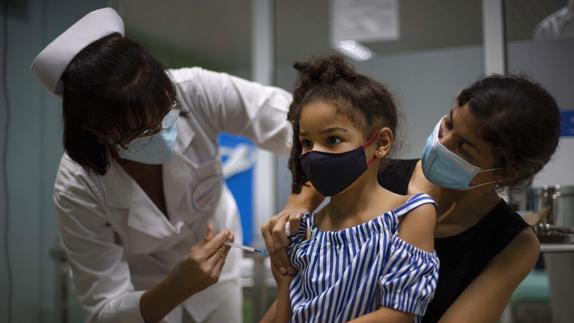 A girl gets a dose of the Cuban made Soberana-02 vaccine for COVID-19 in Havana, Cuba, Aug 24, 2021. (RAMON ESPINOSA / AP)
A girl gets a dose of the Cuban made Soberana-02 vaccine for COVID-19 in Havana, Cuba, Aug 24, 2021. (RAMON ESPINOSA / AP)
Cuba
Cuba registered 877 new cases of COVID-19 and zero death from the disease in the past 24 hours, bringing its total caseload to 1,084,568 and leaving its pandemic death toll at 8,508, the Ministry of Public Health said Thursday.
It also indicated in its daily report that there were currently 3,486 active cases in the Caribbean country.
Denmark
Although COVID-19 infections have markedly declined across Denmark, influenza cases have risen, said the country's Statens Serum Institut (SSI) on Thursday.
"Late in the flu season, there has been a flare-up of influenza here. The number of influenza cases detected is now higher than in previous seasons," said Rebecca Legarth, a ward doctor from the SSI.
The SSI predicted in its weekly report that the number of flu cases will continue to rise "for at least a few more weeks."
Meanwhile, the report reveals a decline in COVID-19-related deaths.
"Another new variant of Omicron, BA. 2, is highly contagious and has maintained infection chains here in March," Henrik Nielsen, professor and chief physician at the Department of Infectious Diseases at Aalborg University Hospital, told Danish news agency Ritzau.
Finland
Finland on Thursday recommended a fourth COVID-19 vaccine dose for people over 80 and those living in care homes.
Hanna Nohynek, an executive physician at the Institute for Health and Welfare, told a press conference that the threshold of 80 had been chosen as the third dose "the third dose "was established to give enough protection against severe illness from that age down."
Some 300,000 people will now be eligible for the fourth dose, which so far has been given to people with seriously weakened immune systems.
Taneli Puumalainen, a director at the Ministry for Health and Welfare, described the number of COVID-19 infections in Finland as "alarming." The health care system is over-burdened, he said, adding: "We appeal to people to protect themselves and others."
The reinfection rate in Finland has exceeded 1.0, and is now hovering between 0.90-1.05. This rate has increased from a previous level of 0.80-0.95.
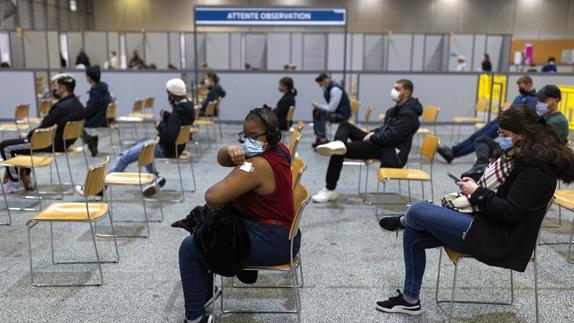 People wait during an observation period after having received Moderna's COVID-19 vaccine, in a vaccination center, in Nantes, western France on Dec 30, 2021. (JEREMIAS GONZELES / AP)
People wait during an observation period after having received Moderna's COVID-19 vaccine, in a vaccination center, in Nantes, western France on Dec 30, 2021. (JEREMIAS GONZELES / AP)
France
France on Thursday reported 148,635 new COVID-19 cases detected in the past 24 hours.
According to the French Public Health Agency, a total of 20,654 COVID-19 patients are hospitalized with 1,523 in intensive care. The average number of new cases in the past seven days stands at 110,874.
Last week, the French government lifted COVID-19 restrictive measures such as the vaccine pass and the mask mandate in indoor areas. Government spokesperson Gabriel Attal said on Wednesday that the resurge of new cases would not have a significant impact on the hospital system.
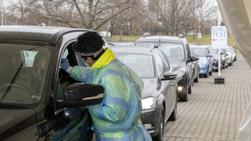 A medical worker takes a swab sample of a car driver at a drive-in COVID-19 testing center in Stuttgart, southwestern Germany on Jan 31, 2022 amid the ongoing pandemic. (THOMAS KIENZLE / AFP)
A medical worker takes a swab sample of a car driver at a drive-in COVID-19 testing center in Stuttgart, southwestern Germany on Jan 31, 2022 amid the ongoing pandemic. (THOMAS KIENZLE / AFP)
Germany
Germany's daily number of COVID-19 infections exceeded 300,000 for the first time since the start of the pandemic, the Robert Koch Institute for infectious diseases said on Thursday.
The RKI registered 318,387 new cases in the past 24 hours, almost 23,500 more than a week ago. The country's seven-day COVID-19 incidence also rose to a new record of 1,752 cases per 100,000 inhabitants, up from 1,734 on the previous day.
"Hospitals are currently treating more COVID-19-infected patients than at any other time during this pandemic," said Gerald Gass, chairman of the management board of the German Hospital Federation (DKG) on Wednesday.
Since the beginning of February, the number of patients has increased by a large margin. A total of 75 percent of hospitals in Germany had to limit their healthcare services due to staff shortages as a result of quarantine measures, according to DKG.
At the beginning of this week, Germany lifted all COVID-19 restrictions except mandatory mask-wearing on public transportation and in care and nursing facilities. However, federal states can introduce tighter restrictions for infection hotspots


